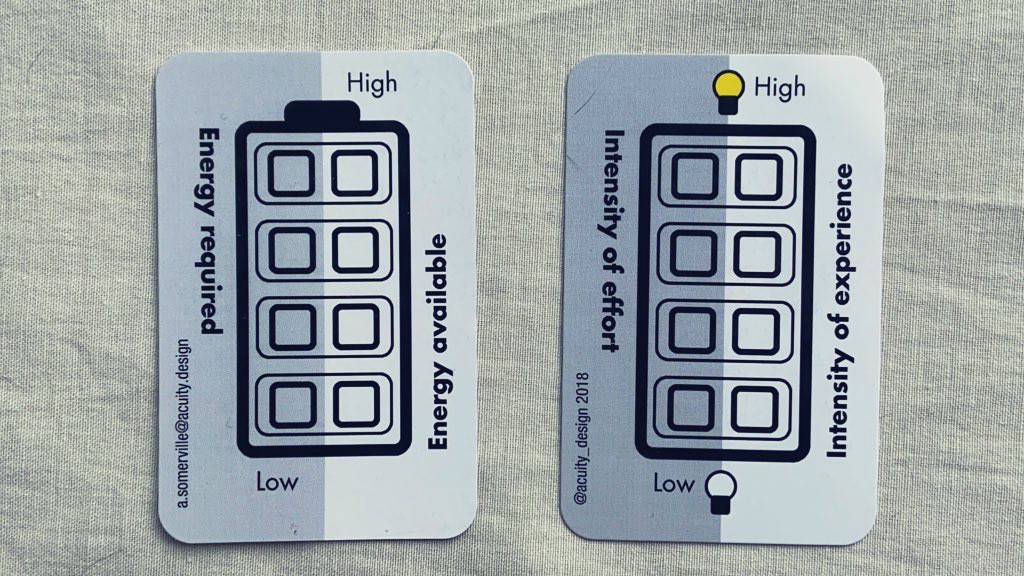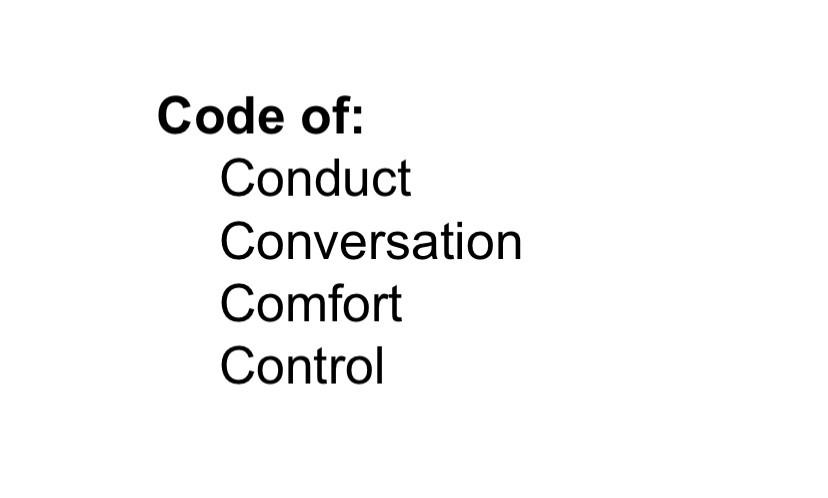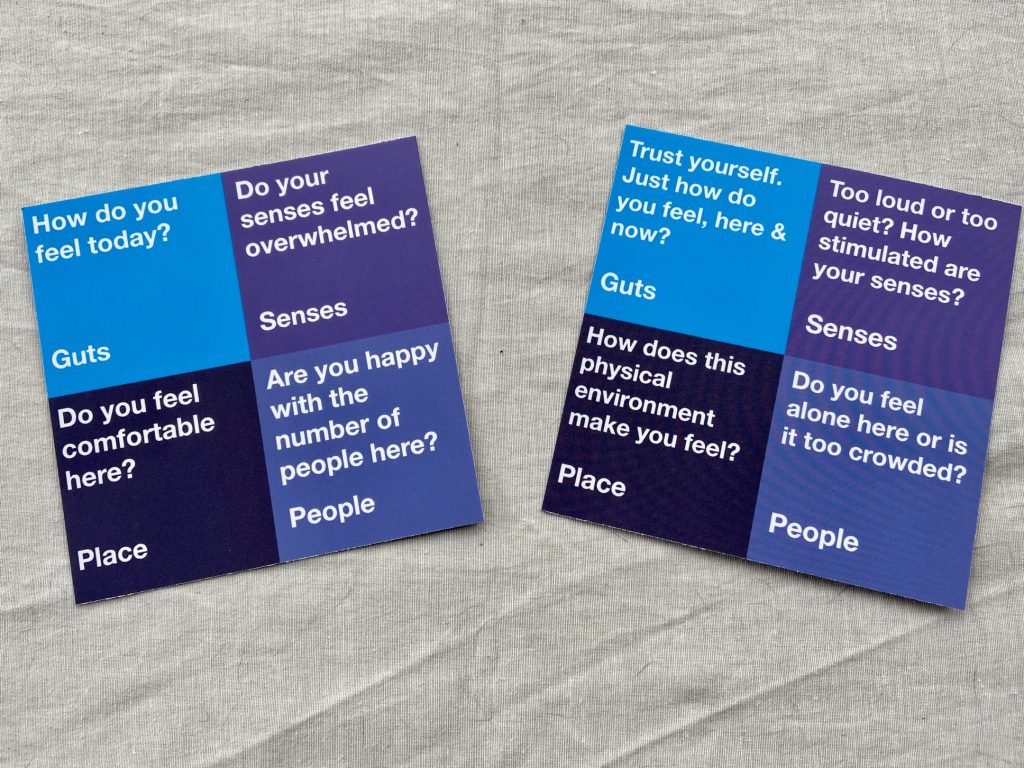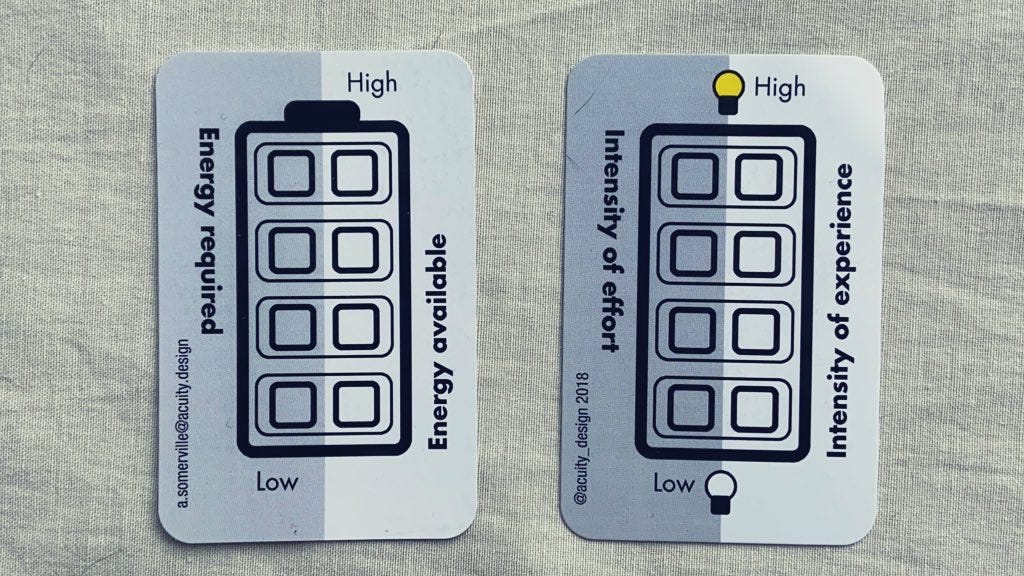
I was sending some Etsy orders lately and Comfort/Capacity Cards were in one package.
This post is about my attempts to lose my control in workshops to offer comfort for participants.
Everyone have fun (or else)
I run (even now online) experiential workshops on senses and emotions and it is hard to talk about those subjects without experiencing sensory or emotional moments.
However, there is a serious tension in this. I generally get good feedback for workshops but there are valid criticisms about such individual and group activities. Facilitators have the power (due to the temporary authority of holding a place and a time for a group of people) to request people do things and interact with other people in novel ways.
There is danger in that power: particularly in any workshop that uses fun or play as defined and initiated by a facilitator. Group pressure, facilitator pressure, lack of personal confidence in a strange place: all of these can push participants into action that they do not enjoy. What they learn is not the workshop theme but how the time was awful and they feel betrayed or disrespected.
Fun is not fun if you do not have the choice to play or to agree the rules of the game and who is playing.
This problem can be hard to spot as there is a bias to believing that what you (as a facilitator or teacher) design as a fun experience must be a fun experience. Your intentions are not bad so what you make cannot be bad. This is a form of unconscious bias.
Offering fun, respectfully

How you invite people into a new place matters. The Art Of Gathering by Priya Parker is a good book for thinking about the whole process of inviting and welcoming people to an event.
My workshop openings have developed over time. At first it was simply the standard conference/corporate warning about Conduct and reporting it to appropriate people. I added Conversation just to enable some shifts in social behaviour (if you are typically loud then shut up and listen to people n your group, if you are quiet then take the opportunity to speak out – this is just a way of getting groups to self-manage their new social interactions and means I need to actively facilitate less).
The important changes are Comfort and Control. These are about being open and disempowering myself.
Comfort is being overt about what is working (or not) in the physical (or online) space. Being comfortable physically and mentally is foundational to any ability to learn. People in distress due to sensory factors, technological anxieties or emotional pains are not going to learn well. They may attend and comply (due to that temporary facilitator authority or because of organisational pressure) but it will not be a positive memory.
I do have a series of cards I place on tables or use as a slide prompt to consider comfort issues.

These four questions cover some of the sensory, physical and emotional senses of comfort that affect people. The prompts are not complete but they are a beginning.
They start people considering the workshop from their perspective and they are the beginning of the pivot to control being passed from me to participants.
Control is the final code and it is the clearest direction that the workshop is facilitated by me but not controlled by me. Each participant has their own sense of control and power. They can leave if the time and place is not right (slides and more are available to use later). They can skip activities if they do not want to be involved. The workshop is a time to spend together to learn positively. Pressuring people to talk or play is not helpful. The workshop is not a test or an examination. People control their time. Sometimes what seemed a good time is not…due to external or personal factors. Power must be with participants, not the facilitator, to choose how involved they are.
Knowing you have power

To end this post, the Comfort/Capacity cards. They are a self-reflection tool for participants. Paying attention to your own well-being during a workshop can be hard because it is a rush of novel ideas and group activities.
The cards (as with most of the physical props I use in workshops) are friction. They are a deliberate grit to stop people and help them think about unconscious issues. Making overt what can be hidden to themselves until it is too late.
Letting people think about how intense an activity will be in the future relative to how much energy they have now allows them to choose and plan before they are overwhelmed.
This is is important about designing for losing control as a facilitator. The participants must be aware that they have control and they must have tools to enable them to take control. Simply announcing you are empowering people is pointless. They must have the capacity and capability to be in control.
- The codes I announce make the switch explicit.
- The cards I offer are tools to make issues overt and to allow positive action.
3 comments: